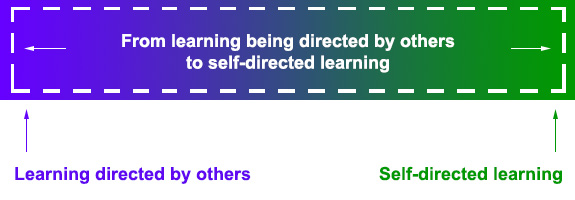From DSC:
The other day, I was reflecting on the gradients of life and learning and how we have various “gradients” in our lifetimes (birth – kindergarten, kindergarten – 8th grade, high school – working adult, etc). Then I shifted that line of thinking towards how we might help people move from positions whereby their learning is directed by others, to situations whereby they direct their own learning. Graphically speaking:

Since then, some postings have caught my eye and have helped me in my thinking here. I’ll list them (and some excerpts from them) below. They speak to the characteristics of someone who is a successful lifelong learner — of someone who enjoys learning and who can direct his/her own learning. These are the types of characteristics that I’d like to suggest we spend more time building (and less time/effort on standardized tests and the like).
Taking a look at the effective lifelong learning inventory — from facultyfocus.com by Maryellen Weimer
Excerpt:
- Growth orientation
- Creative curiosity
- Meaning-making
- Dependence and fragility
- Creativity
- Relationship/interdependence
- Strategic awareness
Seven characteristics of good learners — from facultyfocus.com by Maryellen Weimer
Excerpt:
- Good learners are curious
- Good learners pursue understanding diligently
- Good learners recognize that a lot of learning isn’t fun
- Failure frightens good learners, but they know it’s beneficial
- Good learners make knowledge their own
- Good learners never run out of questions
- Good learners share what they’ve learned
7 mindsets for lifelong learning — from learningtoleap.co.uk by David Shindler
Excerpt:
- Future-oriented
- Time to think
- Questioning assumptions
- Solution-focused
- Breadth of view
- Balancing behaviours
- Renewal
15 ways of the successful self-directed learner — from missiontolearn.com by Jeff Cobb
Excerpt:
The successful lifelong learner is someone who:
- Takes initiative
- Is comfortable with independence
- Is persistent
- Accepts responsibility
- Views problems as challenges, not obstacles
- Is capable of self-discipline
- Has a high degree of curiosity
- Has a strong desire to learn or change
- Is self-confident
- Is able to use basic study skills
- Organizes his or her time
- Sets an appropriate pace for learning
- Develops a plan for completing work
- Has a tendency to be goal-oriented
- Enjoys learning








